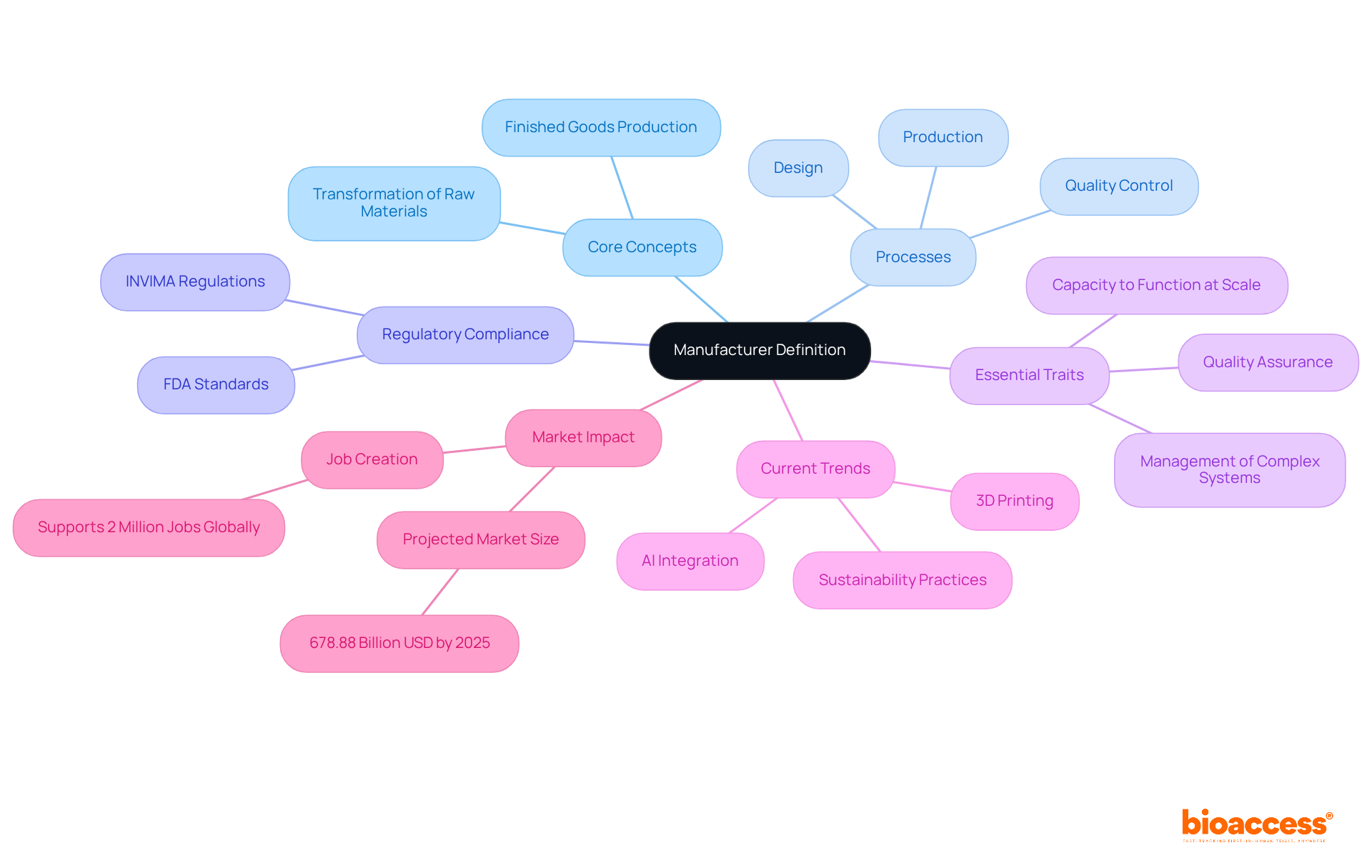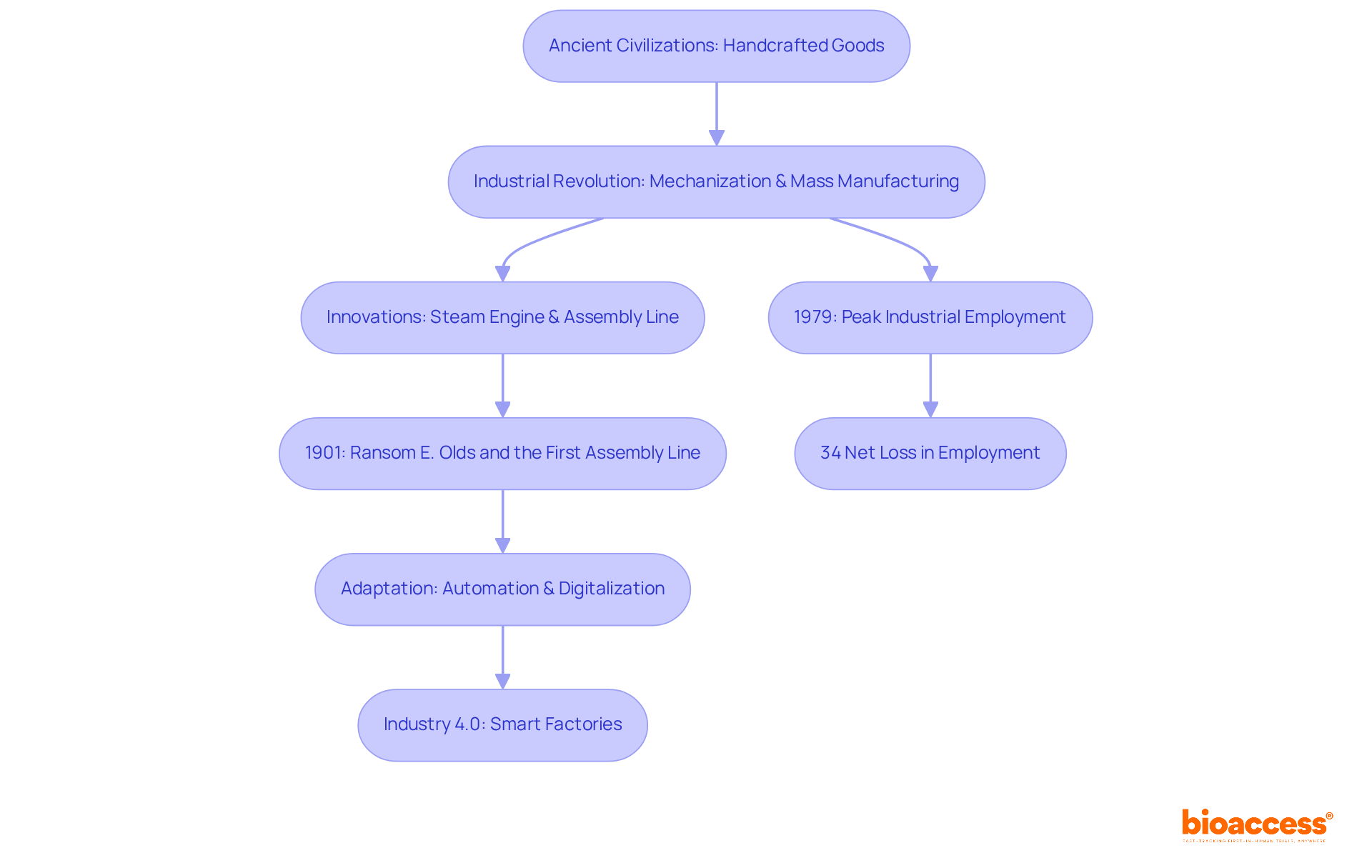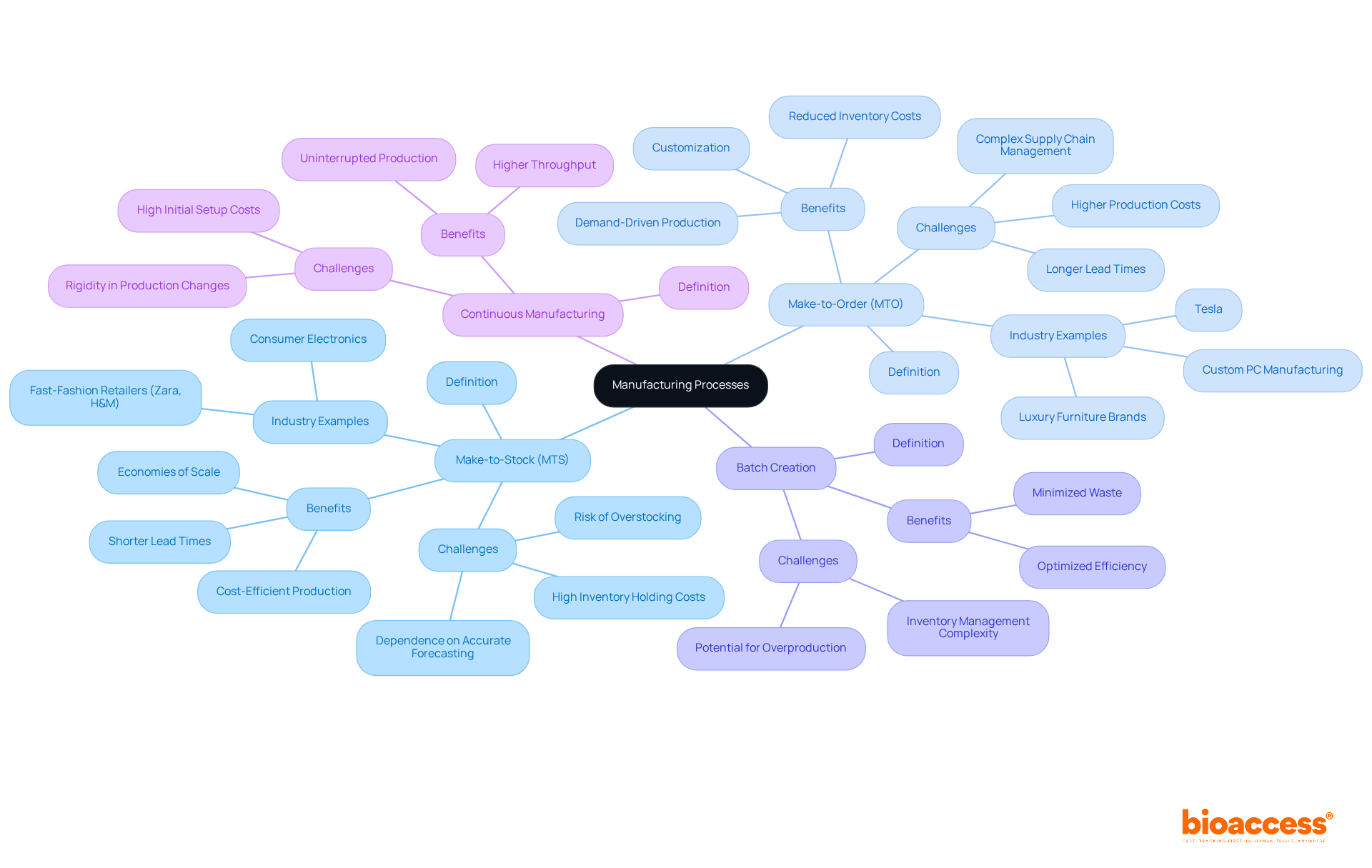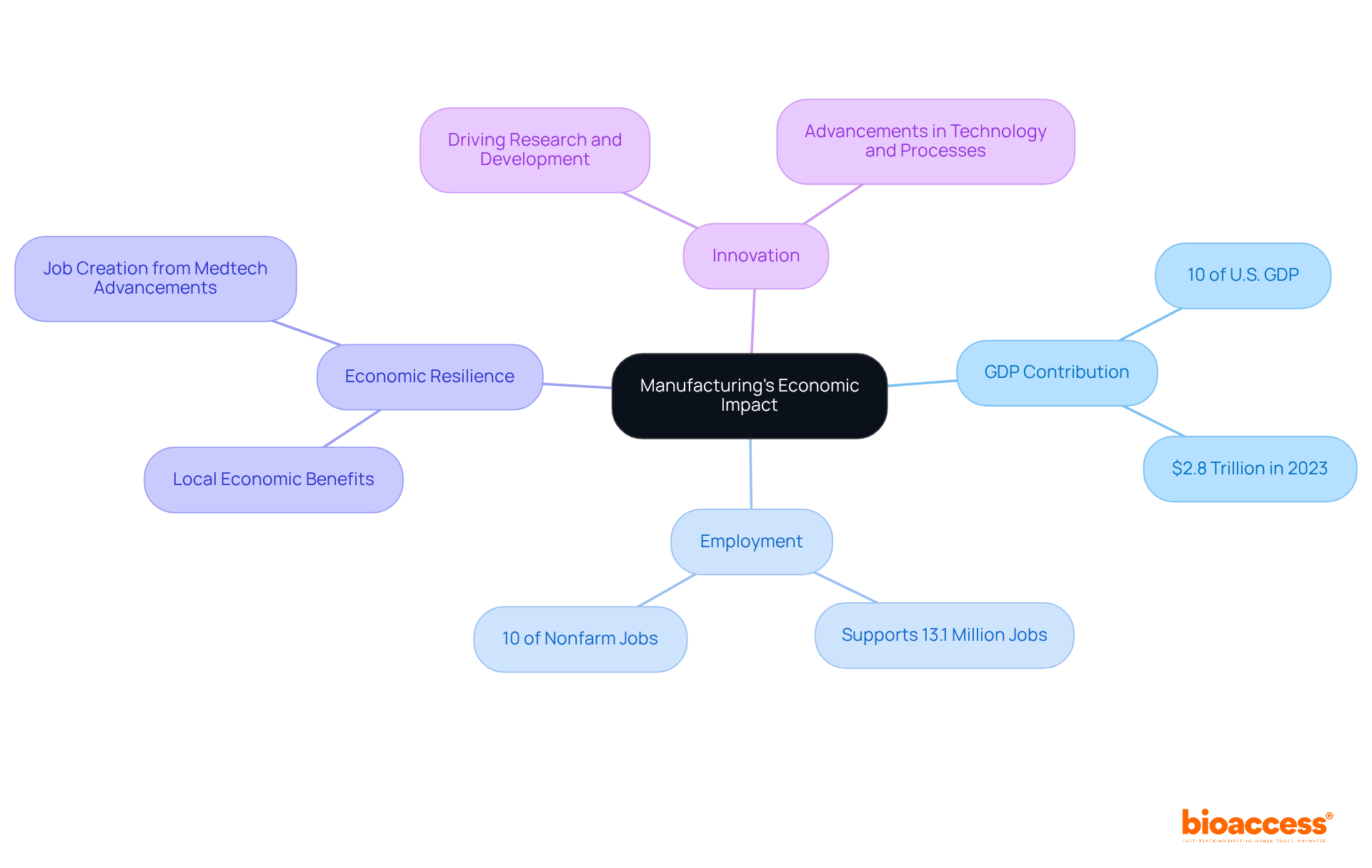


The article provides a comprehensive overview of manufacturers within the business context, highlighting their crucial role in transforming raw materials into finished goods. It emphasizes the necessity for adherence to regulatory standards and the incorporation of modern technologies.
By detailing manufacturing processes, historical evolution, economic impact, and current challenges faced by manufacturers, the article illustrates their critical position in the supply chain and the broader economy. This exploration not only underscores the importance of manufacturers but also prompts a deeper consideration of their impact on the overall economic landscape.
Manufacturers serve as the backbone of the economy, transforming raw materials into finished products through intricate processes and advanced technologies. Their pivotal role in the supply chain extends beyond mere production; they navigate complex regulatory landscapes and embrace sustainability initiatives.
However, as the industry evolves, manufacturers encounter mounting challenges, including supply chain disruptions and the urgent need for technological adaptation.
What does it truly mean to be a manufacturer in today's dynamic market? How can businesses not only survive but thrive amidst these challenges?
These questions underscore the critical relevance of understanding the evolving landscape of manufacturing.
A manufacturer definition business is an entity, whether an individual or a company, that transforms raw materials into finished goods through various processes, tools, and machinery. This transformation encompasses several stages, including design, production, and quality control. In the context of the manufacturer definition business, manufacturers play a pivotal role in the supply chain by not only producing goods but also ensuring compliance with specific standards and regulations. In the medical equipment sector, for instance, producers must comply with strict regulatory standards established by agencies such as the FDA and INVIMA (Colombia National Food and Drug Surveillance Institute) to ensure safety and effectiveness.
INVIMA, designated as a Level 4 health authority by PAHO/WHO, supervises the marketing and production of health products, ensuring adherence to health standards. Essential traits of producers include their capacity to function at scale, oversee intricate systems, and uphold strict quality assurance. Current trends in manufacturing processes highlight the adoption of advanced technologies like AI and 3D printing, which enhance efficiency and customization. Furthermore, producers are progressively concentrating on sustainability by incorporating eco-friendly materials and practices into their operations, demonstrating a rising commitment to environmental responsibility in the industry.
Moreover, in the context of clinical trials, producers engage in feasibility studies, site selection, and project management, which are essential for driving job creation, economic growth, and healthcare improvements. The global market size of the medical device industry is projected to reach $678.88 billion by 2025, expanding at a CAGR of 6%. This underscores the critical role that the manufacturer definition business plays in this dynamic landscape, reinforcing the importance of collaboration and proactive engagement in clinical research.

The evolution of production can be traced back to ancient civilizations, where skilled artisans meticulously crafted goods by hand. The Industrial Revolution marked a pivotal turning point, introducing mechanization and mass manufacturing techniques that significantly boosted output and efficiency. Notable innovations, such as the steam engine and assembly line, transformed production into a systematic and scalable process. For instance, in 1901, Ransom E. Olds pioneered the first assembly line, resulting in a remarkable 500% increase in automobile output within a single year, showcasing the effectiveness of this method in enhancing manufacturing speed.
As manufacturing progressed, it continually adapted to technological advancements, incorporating automation and digitalization. This evolution has ushered in the current era of Industry 4.0, characterized by smart factories and interconnected systems that optimize production and supply chain management. Understanding the historical context of these developments is essential for grasping the complexities and capabilities of modern manufacturers, reflecting the manufacturer definition business, as they navigate an increasingly competitive landscape shaped by both historical innovations and contemporary technological trends.
However, it is crucial to recognize that the production sector has encountered significant challenges in recent decades. Since its peak in June 1979, industrial employment has experienced a 34-percent net loss, reflecting the long-term ramifications of these historical shifts. As noted by Katelynn Harris from the U.S. Bureau of Labor Statistics, the industry has struggled to regain its former prominence. Furthermore, the introduction of lean manufacturing by the Toyota Motor Corporation in 1948 exemplifies the evolution of manufacturing practices, emphasizing efficiency and waste reduction. This historical context is vital for understanding the complexities and capabilities as outlined in the manufacturer definition business of modern manufacturers.

Manufacturing processes can be classified into various categories, notably Make-to-Stock (MTS) and Make-to-Order (MTO). MTS entails producing goods based on projected demand, facilitating rapid delivery while necessitating meticulous inventory management to avoid excess stock and high carrying costs. Conversely, MTO focuses on producing items only after receiving customer orders, which allows for product customization but may lead to extended lead times, usually longer than those of MTS.
Furthermore, batch creation, where items are made in groups, and continuous manufacturing, marked by uninterrupted processes, play vital roles in optimizing efficiency. Experts highlight that the manufacturer definition business shows effective batch manufacturing can significantly improve operational efficiency, as it enables producers to streamline processes and minimize waste. For example, in the Medtech industry, firms are increasingly embracing MTS and MTO strategies to synchronize output with changing market needs and regulatory standards.
In biopharmaceuticals, MTO production exemplifies how firms can tailor products to meet specific patient needs, thereby improving overall satisfaction and outcomes. As Henry Kivimaa notes, MTO enhances customer satisfaction through tailored products, making it essential for the manufacturer definition business to stay abreast of current trends in batch and continuous production to enhance their responsiveness and competitiveness in the marketplace.

Manufacturing stands as a fundamental pillar of economic development, significantly impacting both GDP and employment. In the United States, the production sector contributes around 10% to the GDP, translating to approximately $2.8 trillion in 2023, while supporting about 13.1 million jobs, which represents 10% of nonfarm business sector employment. This sector's influence extends beyond direct job creation; it generates substantial demand for raw materials, logistics, and ancillary services, thus bolstering local economies. Furthermore, production acts as a catalyst for innovation, driving research and development that leads to advancements in technology and processes, ultimately enhancing productivity.
The health of the manufacturing sector is often viewed as a key indicator of overall economic vitality, particularly in specialized fields such as Medtech, where job creation and technological advancements are crucial for industry growth. For instance, when clinical studies are conducted in various countries, they create ripples of economic benefits, including job creation and improved healthcare systems. This international collaboration not only fosters economic growth but also enhances the global health landscape.
As the sector evolves, its role in fostering economic resilience and job opportunities remains paramount, particularly through the lens of Medtech innovation and its far-reaching impacts.

Manufacturers today face a challenging landscape characterized by:
The COVID-19 pandemic has highlighted vulnerabilities in global supply chains, with:
As producers transition from just-in-time to just-in-case inventory strategies, stock levels have increased by 15% post-COVID. This shift has made the financial strain of compliance measures increasingly evident, often requiring substantial investments in time and resources.
Furthermore, the rapid pace of technological change demands ongoing investment in new tools and processes to maintain competitiveness. Digital transformation is no longer optional;
Addressing these interconnected challenges is essential for the manufacturer definition business that is striving to sustain growth and foster innovation in an ever-evolving market.

Understanding the definition of manufacturers in business is crucial for grasping their significant role in the economy and supply chain. Manufacturers are not merely producers; they are essential entities that convert raw materials into finished goods while navigating complex processes, regulatory standards, and technological advancements. Their contributions extend beyond production, impacting economic growth, job creation, and innovation across various sectors.
Throughout the article, key insights have been shared regarding the evolution of manufacturing, the different types of manufacturing processes, and the economic implications of this vital industry. From the historical advancements that shaped modern production methods to the challenges faced in today's landscape, such as regulatory compliance and supply chain disruptions, the importance of manufacturers is underscored. The discussion also highlights how trends like sustainability and digital transformation are reshaping the future of manufacturing.
The significance of understanding the manufacturer definition in business cannot be overstated. As industries continue to evolve, the need for collaboration, innovation, and adaptability will only grow more pronounced. Embracing these changes will empower manufacturers to thrive in a competitive environment, ultimately benefiting economies and communities alike. Engaging with the insights presented in this article can inspire a deeper appreciation for the complexities of manufacturing and encourage proactive participation in fostering its growth and resilience.
What is a manufacturer?
A manufacturer is an entity, either an individual or a company, that transforms raw materials into finished goods through various processes, tools, and machinery. This includes stages such as design, production, and quality control.
What role do manufacturers play in the supply chain?
Manufacturers play a crucial role in the supply chain by producing goods and ensuring compliance with specific standards and regulations, which is particularly important in sectors like medical equipment.
What are some essential traits of producers?
Essential traits of producers include the ability to operate at scale, manage complex systems, and maintain strict quality assurance.
How has technology influenced manufacturing processes?
Current trends in manufacturing highlight the adoption of advanced technologies like AI and 3D printing, which enhance efficiency and customization.
What is the significance of sustainability in manufacturing?
Manufacturers are increasingly focusing on sustainability by incorporating eco-friendly materials and practices into their operations, reflecting a growing commitment to environmental responsibility.
How did the Industrial Revolution impact manufacturing?
The Industrial Revolution introduced mechanization and mass manufacturing techniques, significantly boosting output and efficiency, with innovations like the steam engine and assembly line transforming production processes.
What was a notable achievement in manufacturing history?
In 1901, Ransom E. Olds pioneered the first assembly line, leading to a 500% increase in automobile output within a year, demonstrating the effectiveness of this method.
What is Industry 4.0?
Industry 4.0 refers to the current era of manufacturing characterized by smart factories and interconnected systems that optimize production and supply chain management.
What challenges has the manufacturing sector faced in recent decades?
The manufacturing sector has experienced a significant decline in industrial employment, with a 34-percent net loss since its peak in June 1979, struggling to regain its former prominence.
What is lean manufacturing, and who introduced it?
Lean manufacturing is a practice that emphasizes efficiency and waste reduction, introduced by the Toyota Motor Corporation in 1948.